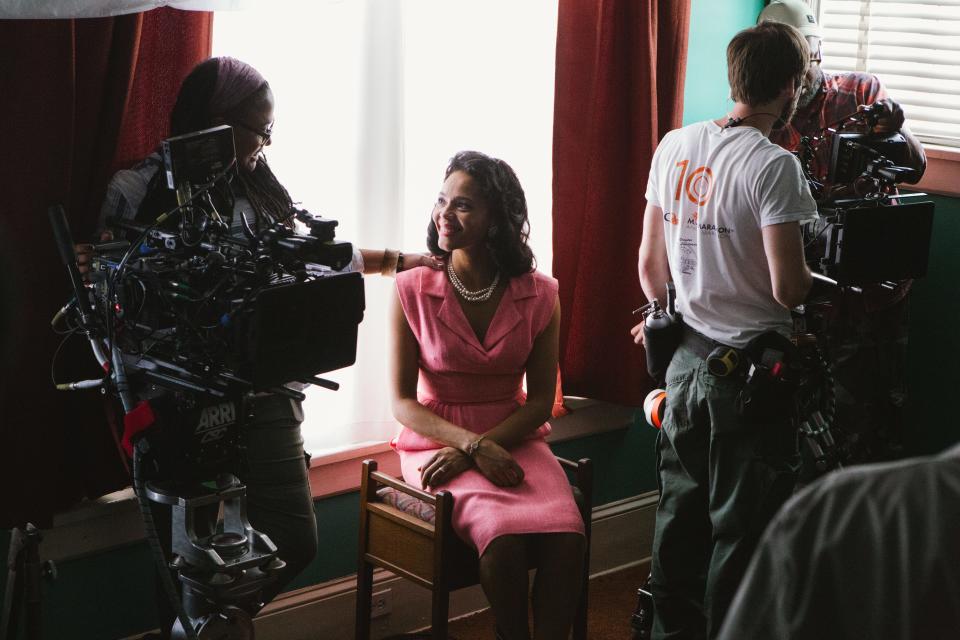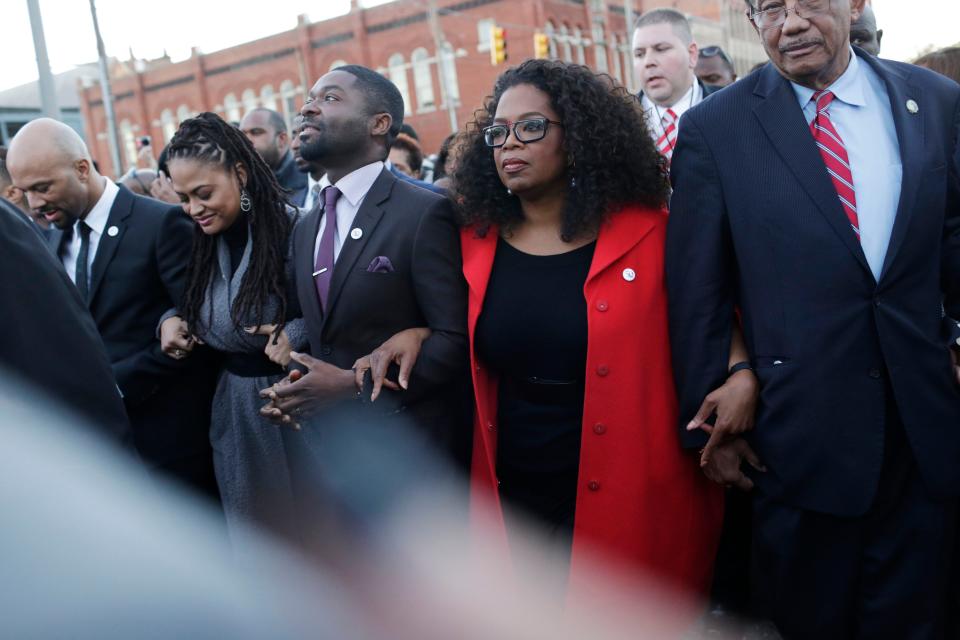Black women filmmakers are using their craft to re-examine history, American life
Keziah Ridgeway can't stop watching teachers run up and down their dated, brick-wall hallway. Scenes of stressed educators grappling with meager classroom resources feel all too familiar to an African American history teacher in one of Philadelphia’s largest high schools.
She turns to the screen each week, and she sees herself.
“It could only be a Philly native, who is a product of public schools, who could write something that is so spot-on about the education system of Philadelphia,” said the 35-year-old Northeast High School teacher, born and raised in the same city.
“Abbott Elementary,” a new ABC sitcom created by and starring Quinta Brunson, traces daily chaos in a south Philadelphia school through the eyes of its teachers. It's a close-to-home depiction Ridgeway never expected on prime-time television. And the history buff is used to a Black woman’s perspective going unnoted.
Stories that revolve around the experience of Black women have long been overlooked in some of the nation’s most iconic historic moments: voting rights, civil rights, space exploration and more. But across film and TV today, new generations of writers, directors and other creators are using their craft to re-examine American history, American culture — or simply capture American life.
And more than ever, Black women storytellers are those breaking into mainstream.

“I think one of the reasons we are seeing a shift is because Black women are not allowing themselves to wait for someone to give them an opportunity. They're not allowing themselves to play background anymore,” Ridgeway said.
“It’s pushing our stories to the forefront and giving people opportunities that we might not have had if a Black woman didn't stand up.”
Abbott joins a burgeoning cast of projects led by Black female creators in the past decade: “13th,” “When They See Us,” “One Night in Miami,” “Women of the Movement,” “Respect,” "Harriet," “Underground,” “Mudbound,” “Lovecraft Country,” “Pariah,” “Insecure,” “P-Valley,” “Pose,” "Queen Sugar" and many more.
Shonda Rhimes and Oprah Winfrey are TV moguls. Ava DuVernay is now the first Black woman to direct a film budgeted over $100 million. Kasi Lemmons is an award-winning director, writer and actress, first to bring abolitionist Harriet Tubman to major motion picture. Lena Waithe is the first Black woman to win an Emmy for Outstanding Writing for a Comedy Series. Janet Mock has become a trailblazing advocate for centering LGBTQ stories. And, Issa Rae is the first Black woman to create and star in a premium cable series. The list continues.

This evolution can be traced, said Racquel Gates, an associate professor of film at Columbia University. Changes in production, film criticism, film school graduates, leadership in streaming companies, social media access, alongside other pushes for more diverse content, she said, have all had their impact. Successful Black creators have also formed production companies — like Oprah's Harpo Productions, Spike Lee's 40 Acres and a Mule, Tyler Perry Studios, Ice Cube and Matt Alvarez's CubeVision and more — as pipelines for future talent.
"The diversification of these, I would call, ‘invisible industries,’ like production, the money behind things... feels really significant,” said the researcher focused on Blackness and popular culture.
Notable Black women filmmakers like Julie Dash, Kathleen Collins or Jessie Maple never secured the backing or trailblazing success of today’s DuVernay or Dee Rees. Yvette Lee Bowser's "Living Single" and Mara Brock Akil's "Girlfriends" blazed trails of their own in TV, but are often unsung influencers of other hit series like "Friends."
“Black women have always been at the forefront of these things,” Ridgeway said, considering both film and history itself.
It’s just a matter of whether you could see it.
A look to Black history

This question echoed in Martha Jones’ mind throughout the mid-90s.
“I've learned the history of women's politics, women's voting rights and more,” recalled the once-graduate student of history. “Why have I never read anything about Black women in that story?”
The legal and cultural historian said she stepped into grad school when African American Women's History had been “blossoming” as a subfield in U.S. history and academic research.
She wanted in.
The Johns Hopkins University professor began to examine how Black people have shaped the country, with a particular focus on the contributions of women. Her most recent book, “Vanguard: How Black Women Broke Barriers, Won the Vote, and Insisted on Equality for All,” dives into over 200 years of women’s thinking and organizing in American politics — from the abolitionist movement to early movements for voting rights, civil rights and more.
“You're going back to the kind of moments that people have studied over and over and over again,” Jones said. “But somehow they haven't honed in on where Black women are.”
How much do you know?: 20 things to know for Black History Month: Test your knowledge
His story wasn’t taught in school:: Black soldier who crossed Delaware with Washington will be honored in New Jersey
In the same period as the 1848 Seneca Falls Convention in New York, a church convention led by Black women in Philadelphia also demanded equal rights. Alongside the famous words of Frederick Douglass and Elizabeth Cady Stanton, a Black woman poet and anti-slave lecturer also took part in well-documented debates of the 1860s on voting rights. The Voting Rights Act of 1965 in many ways marks the moment when all women can see a culmination of a 45-year political struggle.
“We don't always remember it that way,” Jones said. “We can remember everybody from the organizers like Fannie Lou Hamer, to the legal advocates like Constance Baker Motley, to the many thousands of women foot soldiers in the Civil Rights Movement.
“But we only see those women when we look for them.”

Away from the books, Philadelphia teacher Keziah Ridgeway still finds herself learning about these contributions.
Sometimes, film has even helped fill in the blanks.
“I think probably the most obvious example is the movie Hidden Figures,” said the mother of four, referencing a blockbuster based on the book by Margot Lee Shetterly, a Black woman, researcher and American nonfiction writer.
“Here you have these three Black women that were pretty essential in helping send Americans to space, and it's something that most of us didn't learn about until the movie came out. I didn't know, as a history teacher.”
Shetterly’s research would lead to the story about mathematicians Katherine Johnson, Dorothy Vaughan and Mary Jackson and their work for NASA during the Space Race. The film it inspired became one of the most profitable releases of 2016, making over $236 million at box office.
Review: Colin Kaepernick gets raw and real in Netflix drama 'Colin in Black and White'
“There's a kind of synergy happening,” Jones said, as meaningful research that remained largely scholastic from the late-80s to mid-90s takes on new life.
The academic noted another project she’s keeping an eye on this year: HBO’s “The Gilded Age.” Set in New York City at the end of the 19th century, the show’s backdrop echoes that of Downton Abbey and similar period projects of a certain shade.
“What's different?” Jones posed. “Well, there's a Black woman historian who's a co-executive producer of that series, Erica Armstrong Dunbar.”
The historian's notes will also meet fellow Black creative minds in director Salli Richardson-Whitfield, co-writer Sonja Warfield and Tony nominee Denée Benton.
These are collective contributions Jones wouldn’t have always expected.
Far from one note
Black women have long been underrepresented in Hollywood, but the impact today is impossible to miss.
These creatives have climbed Hollywood ranks, leading critically acclaimed projects examining anything from history to American life, with new lenses.
“Lovecraft Country” creator Misha Green juxtaposed a sci-fi storyline with historic events and Jim Crow reality embedded throughout. “Women of the Movement,” created by Marissa Jo Cerar, among others, brought to life the story of Mamie Till Mobley, a mother who devoted her life to finding justice for her son, Emmett Till, after the 14-year-old was bludgeoned and shot. The 1955 case, still reverberating within calls for racial justice today, ended with admitted killers being acquitted.
The story found new resonance being told through the heartbreak and resilience of a mother.
“Part of what’s exciting,” continued film expert Racquel Gates, “is looking at the crop of filmmakers who are now getting the opportunities to tell those stories in different ways — and from different perspectives.”
More history: MLK Jr.'s 'first' civil rights protest and other hidden Black history in South Jersey
Oscar nominations 2022: 'The Power of the Dog' leads with 12, Kristen Stewart nabs first nod

Versatile creatives like DuVernay are in seemingly limitless careers, crafting opportunities for other women directors to follow suit. "Selma" demythologized a Civil Rights icon, according to critics, while "13th" delivered an Academy Award–nominated social justice documentary. But DuVernay's 2012 drama "Middle of Nowhere" reminded audiences that film can find depth in ordinary lives.
Such a career would be unthinkable in previous eras — within an industry DuVernay told Marie Claire in 2019 is still "not very welcoming to Black women filmmakers."
Being “exceptions to the rule,” Gates warned, has often forced Black women creators into crafting specific content, singular expressions of their range.
“The power of this moment, the importance of this moment, is that there doesn't have to be just one,” Gates said. “We're actually seeing a range of approaches and perspectives — in the way that, hopefully, these women get known for their individual and unique approaches to material.
“The hope is that they don't have to necessarily speak on behalf of all Black women directors, at some point.”
Kelly Powers is a culture reporter for the How We Live team — covering race, culture and identity for the USA TODAY Network's Atlantic Region. Contact her at kepowers@gannett.com or 443-694-0770, and follow her on Twitter @kpowers01.
This article originally appeared on USA TODAY NETWORK: Black women filmmakers reshape an industry, bring new perspective
